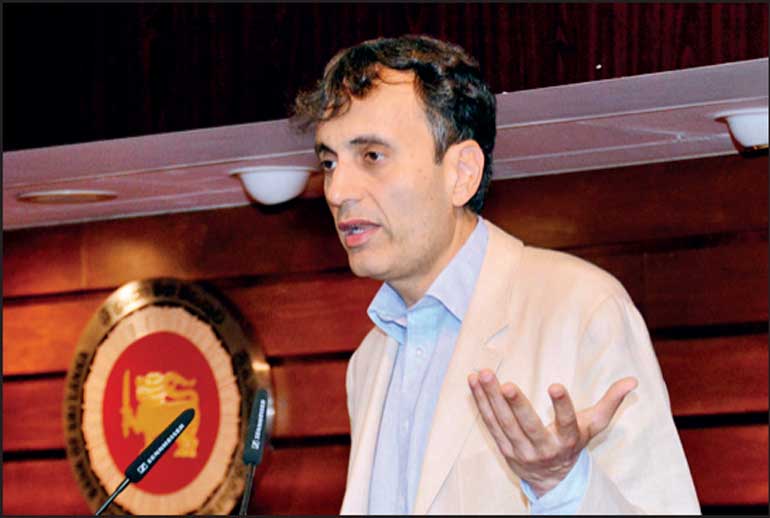Wednesday Feb 25, 2026
Wednesday Feb 25, 2026
Wednesday, 3 January 2024 00:34 - - {{hitsCtrl.values.hits}}

Chairman of Rockefeller International and Founder and CEO Breakout Capital Ruchir Sharma - Pic by Upul Abayasekara
By Divya Thotawatte
Among countries like Brazil, Indonesia, Greece and Poland, Sri Lanka too ranks high with regard to the 10 rules of successful nations except in some areas such as population, politics and the state, an expert said recently.
The public lecture organised by the Central Bank of Sri Lanka featured Rockefeller International Chairman and Breakout Capital Founder and CIO Ruchir Sharma who shared key insights from his book, ‘The 10 Rules of Successful Nations’. In this book, he uses his decades of global analytic experience to determine the 10 rules and areas of growth which are population, politics, state, debt, currency, investment, inflation geography, inequality and sentiment.
“There are almost 200 countries and of these countries only 40 countries or so are classified as developed countries. All the other countries are classified as emerging markets and most of them have been emerging forever.
This is what we have been seeing here in Sri Lanka. There is so much promise and so many opportunities in terms soft human capital, the education levels, etc. We want to believe that Sri Lanka would now have become the model for growth in South Asia in many ways. But Sri Lanka too has been stuck in this trap over the years and the gains are given away. But that is history,” Sharma noted.
He discussed the status of Sri Lanka in relation to the areas for growth mentioned in his book, explaining that Sri Lanka relatively ranked high in average, but there was much to be done to improve overall and increase the engine of growth.
Population sets the speed limit on economic growth and where Sri Lanka’s working age population growth remains 0.1%, it becomes an obstacle for the economic growth of the country, Sharma explained. Furthermore, Sri Lanka scored low in the area of State because the tax contribution to the state remained minimal. Due to the currently volatile political state of the country, Sri Lanka also ranked low in terms of politics where results of an election would determine its development.
Currency being cheap is good if it is stable, but key is avoiding unreliable measures. Sri Lanka ranks well in the area of currency because it is cheap, Sharma said.
In terms of geography, he said that despite the many opportunities and potential, Sri Lanka has not been able to fully exploit and capitalise on its geography. Intraregional trade was vital for the development of countries, yet the South Asia has low intraregional trade, and therefore missed many opportunities for growth. He said that the problem of internal geography was that much of the wealth was concentrated on the Colombo area and not enough on the other areas.
In the area of Sentiment, which is related to the country’s perception by global investors and such, Colombo ranked relatively well. However, he added that still, few people from the outside talked about Sri Lanka where there was an indifference on the subject of Sri Lanka. Since the expectations were very low, there was plenty of potential for surprise, he pointed out.
“Generally, I would say, Sri Lanka ranks relatively well at this standpoint from an investment perspective and issues of liquidity among other things. But this is a big improvement over the last couple of years. Once the political situation is stable, the key for Sri Lanka is, what is going to be your growth engine.
The classic growth engine was manufacturing exports for countries with Sri Lanka’s per capita income to grow rapidly. But with that growth engine looking difficult, what can be the growth engine for Sri Lanka to grow even at 5% because 6-7% seems very difficult given the demographics of the country.”
He stressed that the country should determine the suitable growth engine for it as even developing the economic growth rate by 5% was crucial. Sri Lanka should catch up considering the time lost during its economic crisis.
While in Sharma’s lists of rankings, Sri Lanka, Brazil, Indonesia, Greece and Poland ranked as ‘good’ on average, some countries that scored generally low were Egypt, Taiwan, Pakistan, Czech and Colombia.